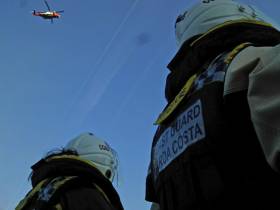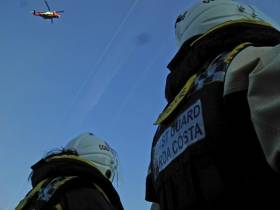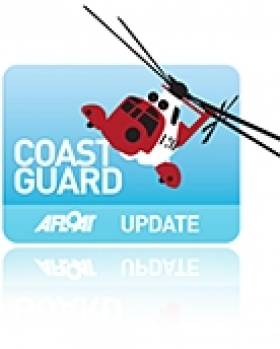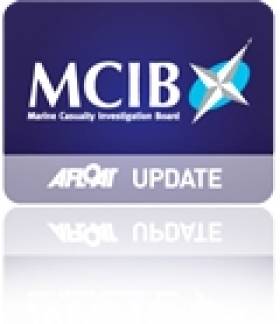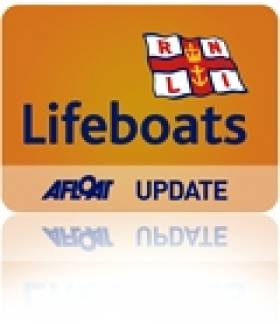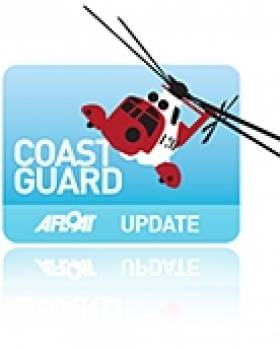Displaying items by tag: Rescue 117
#Rescue - A tanker crewman was airlifted to hospital from the Port of Cork yesterday evening (Saturday 17 June) after sustaining a leg injury on board his vessel, as the Irish Examiner reports.
The Waterford-based Irish Coast Guard helicopter Rescue 117 was dispatched for the medevac of the casualty, who is thought to have broken his leg after a cable or rope snapped, after the local fire service was unable to remove him safely.
The Irish Examiner has much more on the story HERE.
Coastguard Helicopters In Monday Morning Medevacs
#Coastguard - Irish Coast Guard helicopters were called on for two separate evacuations from fishing vessels yesterday morning (Monday 16 January).
In the first incident, Waterford-based Rescue 117 airlifted a fisherman who had suffered an injury on board his vessel to University Hospital Waterford.
On the same morning, Rescue 115 from Shannon was tasked to retrieve a casualty from a fishing vessel some 120 miles west of Kerry Head and transport him to University Hospital Limerick.
MEDICO Cork, based at Cork University Hospital’s A&E department, provided advice for both coastguard medevacs.
Coastguard Helicopter In Double Rescue On Sunday
#Coastguard - The Irish Coast Guard's Waterford-based rescue helicopter recovered two casualties in separate incidents on Sunday, according to the Irish Examiner.
One fisherman was retrieved from the French fishing vessel Larche some 50 nautical miles south of Cork after complaining of chest pains and difficulty breathing.
The man was winched on board coastguard helicopter Rescue 117 and transferred to hospital in Cork for treatment.
In a separate incident, a hillwalker was airlifted from Slievenamon in Tipperary after suffering leg injuries in a fall - the second such accident in the area over the weekend.
Report into Death of Crab Fisherman Prompts Call for Review of Stability Standards
#MCIB - The Marine Casualty Investigation Board (MCIB) has recommended a ministerial review of stability standards for fishing vessels following its report into the death of a crab fisherman off Co Cork in January last year.
Gerry Hegarty drowned after a wave struck the crab boat Carraig An Iasc, which was fully loaded with crab pots at the time, causing it to capsize and sending its two-man crew into the water.
Hegarty, who was not wearing a personal flotation device (PFD) or other buoyancy aid, got into difficulty while attempting to swim ashore with his crewmate and skipper James Fitzgerald, who subsequently raised the alarm.
Lifeboats from Ballycotton and Crosshaven, as well as Irish Coast Guard helicopter Rescue 117, were tasked to the incident. Divers from Naval Service vessel LE Emer located the sunken crab boat but no body was found.
A coastguard search of the area continued over a number of days without success. Hegarty's body was eventually recovered on 17 February 2011 at Ringabella Strand in Co Cork.
The MCIB found it probable that the Carraig An Iasc encountered wind or wave action or a combination of both that caused the vessel to heel to an angle beyond which it was able to recover from its loaded condition. The vessel's Code of Practice Declaration of Compliance was valid until 15 July 2013.
The board noted that there have been "a number of incidents caused by overloading boats thus effecting stability", and recommended that the Minister for Transport reviews and revises the stability standards in the current Code of Practice to improve these standards.
It was also recommended that a safety notice be issued to all skippers and owners in the fishing fleet reminding them of their legal responsibility to ensure that all their crew wear PFDs or lifejackets while on deck.
The full report is available to download as a PDF from the MCIB website HERE.
- Crosshaven
- Cork
- Safety
- Fishing
- Ballycotton
- Lifejacket
- Lifeboat
- Marine Casualty Investigation Board
- Coastguard
- Irish Coast Guard
- Skipper
- naval service
- helicopter
- MCIB
- Rescue 117
- personal flotation device
- Minister for Transport
- LE Emer
- standards
- drowned
- crab fishing
- Carraig An Iasc
- Gerry Hegarty
- James Fitzgerald
- PFD
- Ringabella Strand
- Code of Practice
- stability
- overloading
Ballycotton Lifeboat Launched to Assist Ailing Fishing Vessel
#LIFEBOATS - Ballycotton's RNLI lifeboat was dispatched in poor conditions Wednesday evening to fishing boat taking on water some 20 miles south east of the Co Cork town, FishNewsEU.com reports.
Assisted by the Waterford coastguard helicopter Rescue 117, the lifeboat stood by the Irish-registered fishing vessel as its four-man crew kept the water intake under control and headed towards Ballycotton harbour under its own power.
Once returned to port, an RNLI salvage pump was placed aboard the boat to extract the excess water, and the crew offered thanks to the emergency services for their assistance.
New Rescue Series Airs on RTE This September-Promo Vid Here!
Rescue 117 is RTÉ’s new 6 part documentary series capturing rescues as they unfold from the Irish Coast Guard’s helicopter search and rescue base in Waterford, Ireland. The series airs on RTE1 at 8.30pm on 14th September. A promo video is below


























